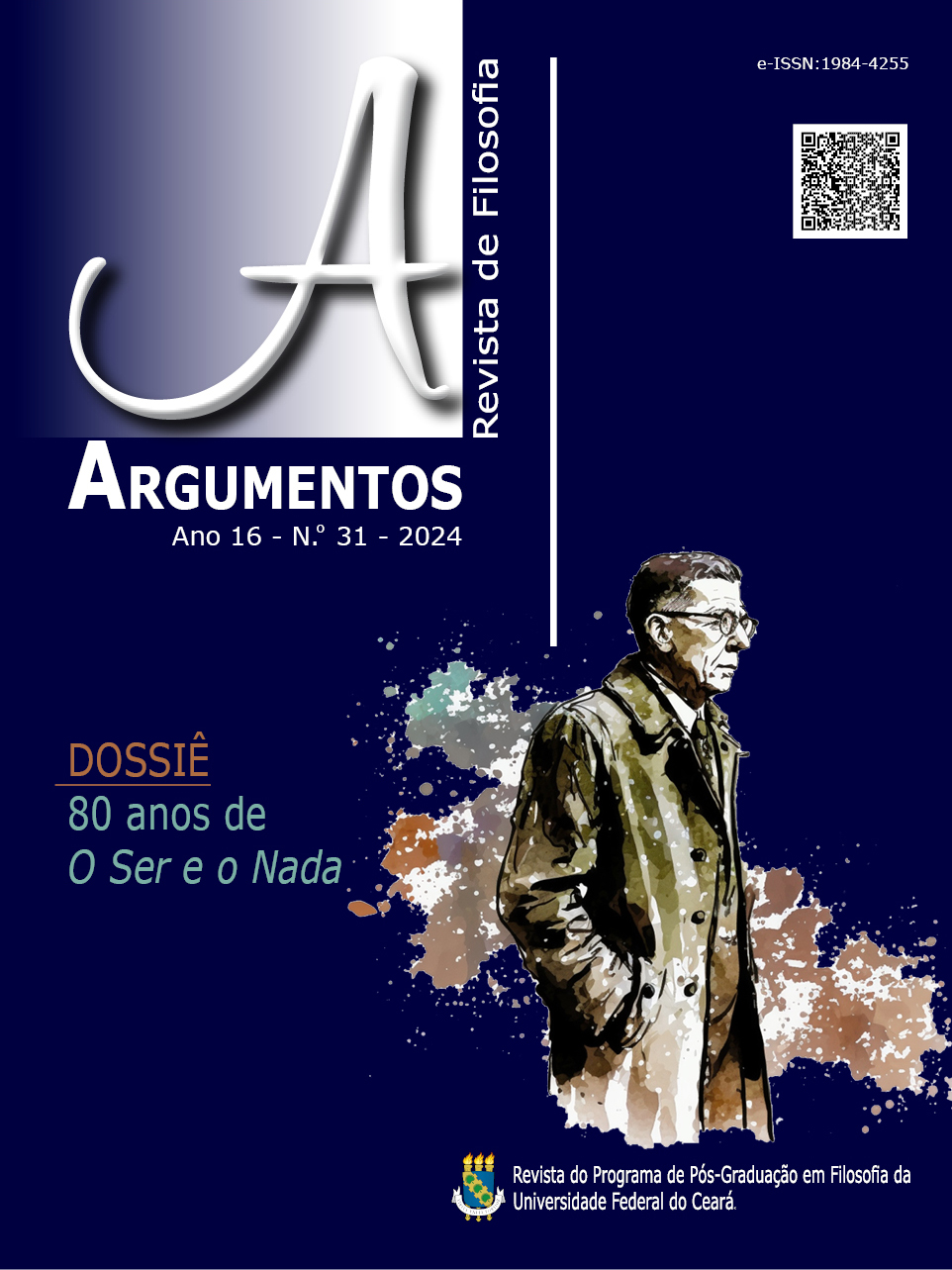The Extended Mind
DOI:
https://doi.org/10.36517/Argumentos.31.20Keywords:
Mente estendida.Abstract
Onde acaba a mente e começa o mundo? A pergunta solicita duas respostas standard. Alguns aceitam as fronteiras da pele e do cérebro e dizem que o que se encontra fora do corpo está fora da mente. Outros ficam impressionados por argumentos sugerindo que o significado das nossas palavras “simplesmente não está na cabeça”, sustentando que este externismo a respeito do significado leva a um externismo sobre a mente. Propomo-nos seguir uma terceira posição. Defendemos um tipo de externismo muito diferente: um externismo ativo baseado no papel ativo do ambiente orientando processos cognitivos.
Downloads
References
BEER, R. Intelligence as Adaptive Behavior. New York: Academic Press, 1989.
BLAKE, A.; YUILLE, A. (Eds.). Active Vision. Cambridge: MIT Press, 1992.
BURGE, T. Individualism and the mental. Midwest Studies in Philosophy, n. 4, p. 73-122, 1979.
CHALMERS, D. J. The components of content. In: CHALMERS, D. J. (Ed.). Philosophy of Mind: Classical and Contemporary Readings. Oxford: Oxford University Press, 2002.
CLARK, A. Microcognition. Cambridge: MIT Press, 1989.
HAUGELAND, J. Mind embodied and embedded. In: HOUNG, Y.; HO, J. (Eds.). Mind and Cognition. Taipei: Academia Sinica, 1995.
HUTCHINS, E. Cognition in the Wild. Cambridge: MIT Press, 1995.
KIRSH, D. The intelligent use of space. Artificial Intelligence, n. 73, p. 31-68, 1995.
KIRSH, D.; MAGLIO, P. On distinguishing epistemic from pragmatic action. Cognitive Science, n. 18, p. 513-549, 1994.
McCLAMROCK, R. Existential Cognition. Chicago: University of Chicago Press, 1995.
McCLELLAND, J. L.; RUMELHART, D. E.; HINTON, G. E. The appeal of parallel distributed processing. In: McCLELLAND, J. L.; RUMELHART, D. E.; PDP Research Group. Parallel Distributed Processing. Vol. 2. Cambridge: MIT Press, 1986.
McHUGH, M. China Mountain Zhang. New York: Tom Doherty Associates, 1992.
PUTNAM, H. The meaning of “meaning”. In: GUNDERSON, K. (Ed.). Language, Mind and Knowledge. Minneapolis: University of Minnesota Press, 1975.
SIMON, H. The Sciences of the Artificial. Cambridge: MIT Press, 1981.
SUCHMAN, L. Plans and Situated Actions. Cambridge: Cambridge University Press, 1987.
THELEN, E.; SMITH, L. A Dynamic Systems Approach to the Development of Cognition and Action. Cambridge: MIT Press, 1994.
TRIANTAFYLLOU, M.; TRIANTAFYLLOU, G. An efficient swimming machine. Scientific American, v. 272, n. 3, p. 64-70, 1995.
ULLMAN, S.; RICHARDS, W. Image Understanding. Norwood: Ablex, 1984.
VARELA, F.; THOMPSON, E.; ROSCH, E. The Embodied Mind. Cambridge: MIT Press, 1991.
WILSON, R. Wide computationalism. Mind, n. 103, p. 351-372, 1994.
Downloads
Published
Versions
- 2025-03-28 (3)
- 2024-02-25 (2)
How to Cite
Issue
Section
License
Copyright (c) 2024 Argumentos - Revista de Filosofia

This work is licensed under a Creative Commons Attribution 4.0 International License.
Argumentos magazine is licensed under an International Creative Commons Attribution License.
The Magazine uses CC BY inclusion
1) The authors retain the copyright granted to the magazine or the right to initial publication, with the work regularly licensed under the Creative Commons Attribution, which allows the sharing of the work with acknowledgment of authorship and initial publication in this magazine.
2) The authors are authorized to contract additional applicable contracts, for non-exclusive distribution of the version of the work published in this journal (for example, publication in the institutional repository or as a chapter of the book), recognition of authorship and initial publication in this journal.
3) Authors are authorized and encourage to publish and distribute their work online (for example, in institutional repositories or on their personal pages) at any time before or during the editorial process, as they can generate productive changes, as well as increase the impact and reference of published work.




.jpg)










._._3.png)
1.jpg)
._._._.png)
